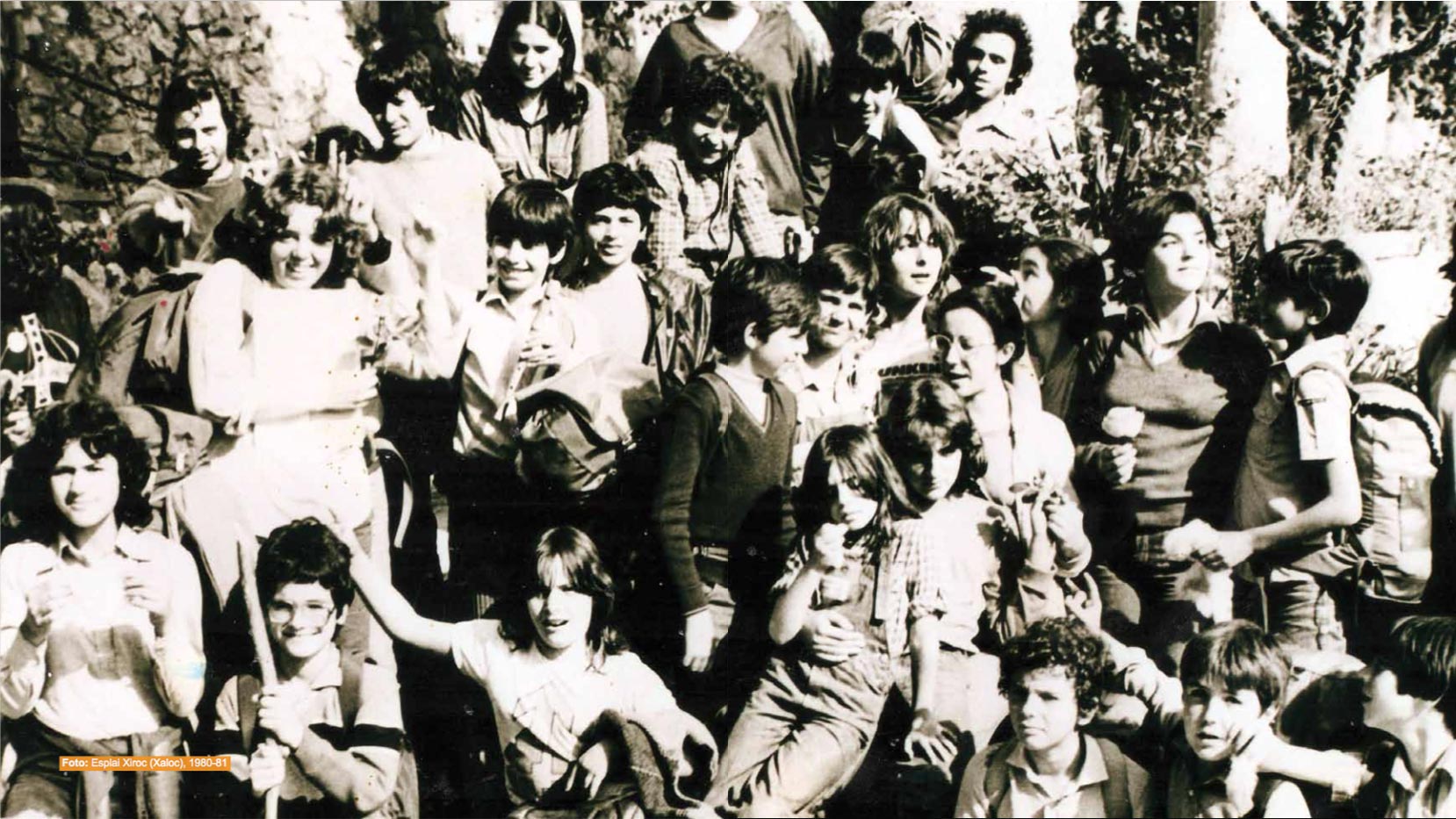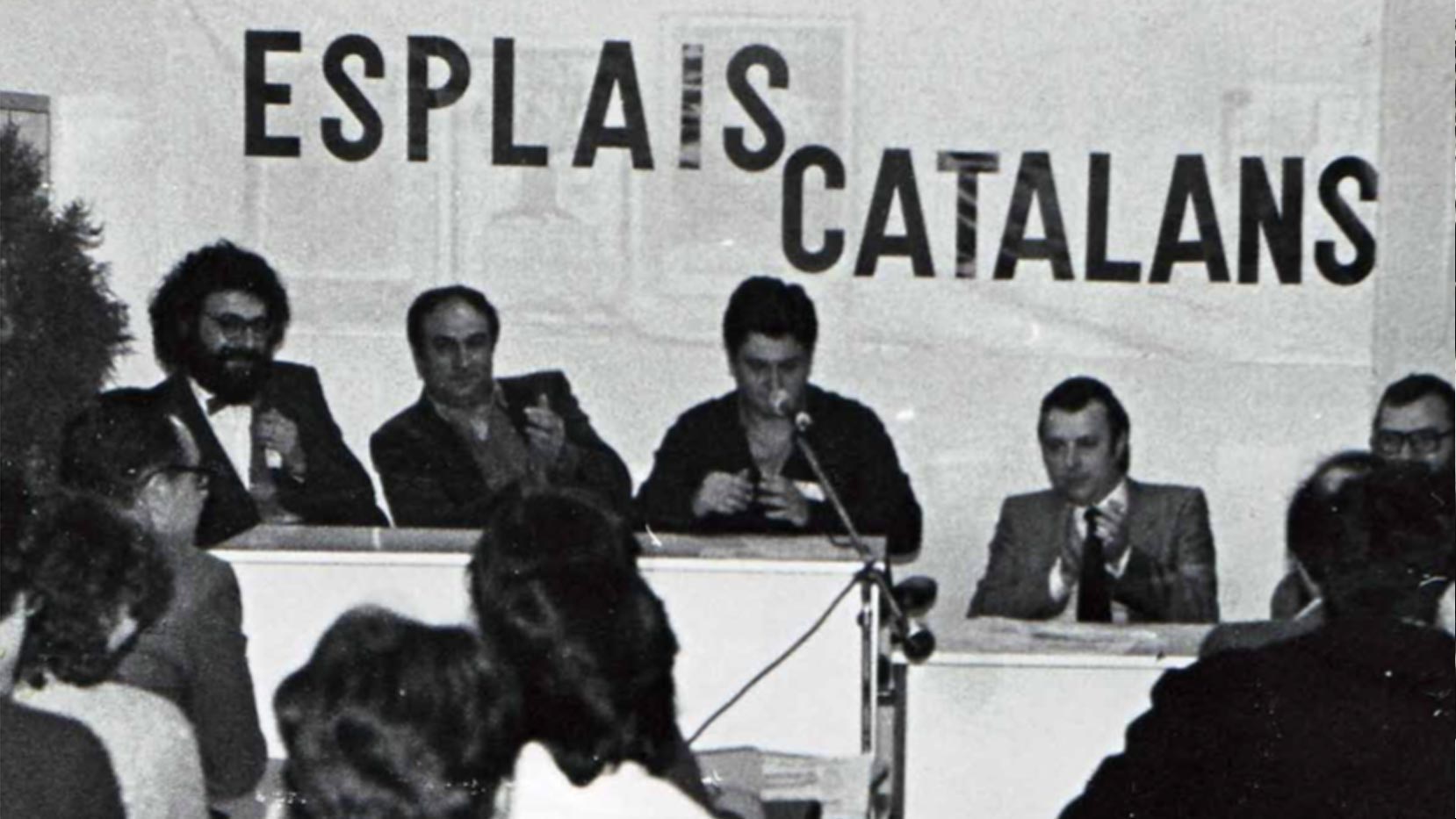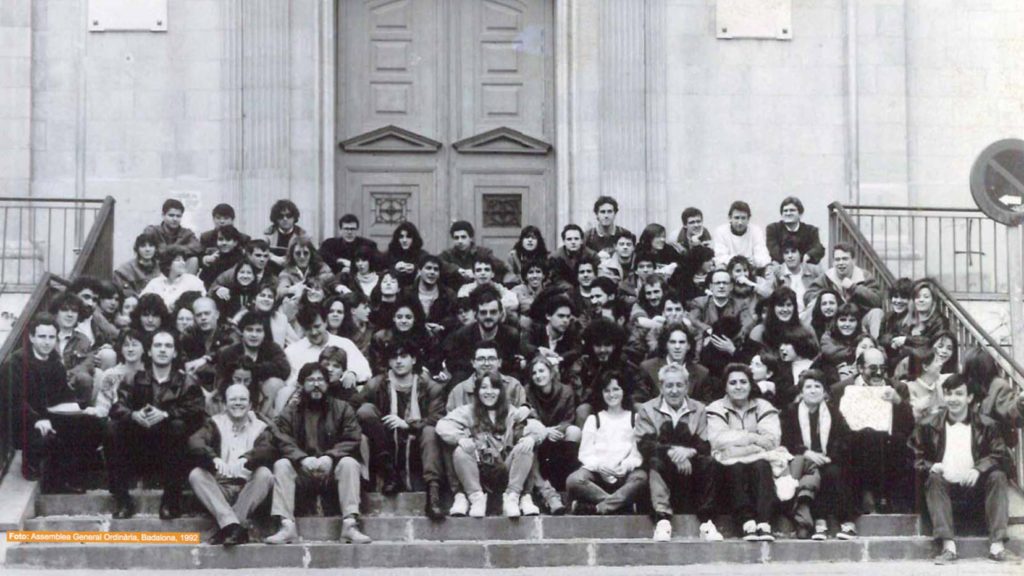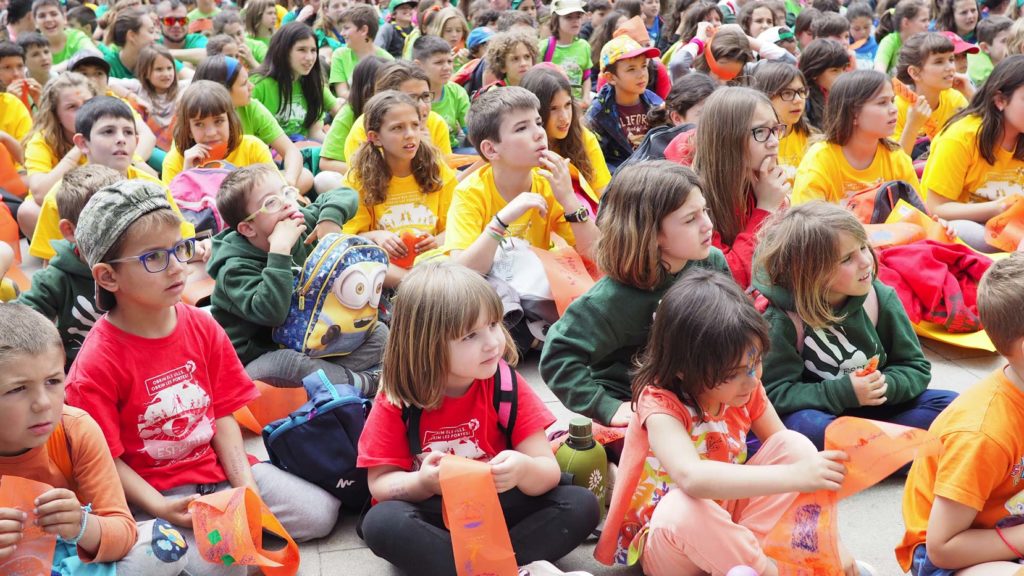About us
Esplais Catalans is a non-religious and progressive association where volunteerism is our way of work to change the society. In our entity, the esplai is a citizen school for children, youth, families and leaders; a popular education way. Esplais Catalans is the result of the esplais’ and people’s willingness to have exchanging, learning and join action places. Equality, freedom, associative participation, environmental education and Children’s Rights are promoted in Esplais Catalans.
In this regard, in Esplais Catalans we help the leaders with their education, we organize events and we promote campaigns and the creation of working commissions about relevant aspects of esplais
About us
Esplais Catalans is a non-religious and progressive association where volunteerism is our way of work to change the society. In our entity, the esplai is a citizen school for children, youth, families and leaders; a popular education way. Esplais Catalans is the result of the esplais’ and people’s willingness to have exchanging, learning and join action places. Equality, freedom, associative participation, environmental education and Children’s Rights are promoted in Esplais Catalans.
In this regard, in Esplais Catalans we help the leaders with their education, we organize events and we promote campaigns and the creation of working commissions about relevant aspects of esplais
Mission, vision and values

Esplais Catalans is a non-religious and progressive association where volunteerism is our way of work to change the society based in Children’s Rights and the popular education.
The strengthening and the esplai’s participation is our reason of being.
 As esplais, we want to be a referent educational agent for the social change of the territory, as well as being inclusive, diverse and recognized for our educational task.
As esplais, we want to be a referent educational agent for the social change of the territory, as well as being inclusive, diverse and recognized for our educational task.
To do it, we will work to be a more diverse, participatory, critical, cohesive, territorially rooted and constantly revised project.
Secularism: we are independent of any religious order. We are a critical movement in favor of the freedom of thought, action and belief of citizens, especially children and young people, with human and children’s rights as a frame of reference. Therefore, we position ourselves in anti-fascism to confront hate speeches that violate these rights.
Global Justice: we are critically questioning the established social, political and economic model, understanding that we live in an interdependent and eco-dependent world. Therefore, we encourage the ability to look outwards, become aware of our global position and recognise and transform our closest reality.
Intersectional Feminism: we have life and care in the centre of our project to transform the binary and cisheteropatriarch system and the inequalities and discriminations it generates. However, we recognise the existence of different axes of oppression and how these intersecte each other. Therefore, bearing in mind our privileges, we want to continue to fight for a safe and just society for all.
Paedocentrism: We place the needs and interests of children and young people at the center of our activity, promoting their active participation and decision-making, through critical thinking.
Educational
Project
Education to, for and about Children’s Rights
Esplais Catalans’ educational project approach arises from the work of children, leaders and families that are part of the association, and from the collection of our ideas and the convictions that guide our way of educating. In order to adapt our entity to the new social context and give answers based on the esplai’s real needs, the documents that constitute the Esplac’s pedagogical project approach are not statics and are in constant evolution. For this reason, nowadays we are developing a new project that will check Esplac’s pedagogic lines.
As a non-religious and progressive association, our education task is based on Children’s Rights. We understand the education based on Children’s Rights using an integral approach that considers the knowledge of the rights and the responsibilities like the learning of the skills and attitudes that we need to obtain a more equal society.
The game is the principal methodology of esplai, because it allows us to work values, competences and skills through a distended and entertaining way. Another great pedagogic tool includes is the holidays and vacation times (camps, routes), because playing in a natural environment fosters aspects like cohabitation in group, personal growth and work of values as the responsible consumption, the solidarity and the cooperation.
The pedagogical lines of Esplac are:
In Esplac we think that the Esplai doesn’t make sense without the participation of children and youth, which we consider an essential key and element in the educational project, which makes the esplai become a school of citizenship and a space for personal growth.
We can find many levels of participation according to the capacity of the participant in the decision-making process. At Esplac we understand the element participation not only as a consultation, but as a real implication of everyone in the project, where everyone is heard, where all the contributions, no matter where they come from, are valid. Get informed; attending to or consulting will be elements of participation; but without the ability to make decisions and take actions in this direction we cannot speak of a real participation but rather of a passive participation in which we are either users of some activity, or simply we are asked but we are not protagonists of the activity.
Human beings live in a specific space and time (now and here!) and from Esplais Catalans we understand that as part of this environment that surrounds us, we have a global responsibility towards our environment and the obligation to ensure its continuity and sustainability in the future.
Taking into account how the society in which we live, this inevitably means that we need complete transformation of the economic and political system and, therefore, the way we consume, feed, relate between each other, and manage our residues and so on.
This transformation of the system must take into account various aspects. On the one hand, the decrease, understanding that constant and unstoppable growth is neither sustainable nor necessary for social and environmental well-being. On the other hand, we must stake on a social economy, solidary, circular and feminist, with democratic and participatory management that is oriented to the needs of the people and that is able to manage the resources with a commitment to the society and its environment.
Teamwork is part of Esplac’s daily life. We work as a team for the development of the association’s projects, for the organization and planning of the activity of the geographical sectors of Esplac and for the coordination of a lot of ordinary tasks of the association.
Our teams are composed of people from the Esplac Technical Secretariat, the Coordination Team, the General Sector Team and/or leaders of the Esplais, depending on the purpose of the team.
In Esplac we use the assembly as the main political organ of the organization to take decisions, being the majority of political decisions taken in assembly.
Esplac educates on the basis of Children’s Rights as described in the association’s mission and promotes that in the esplais we educate for and about children rights. Children need to know their own rights, as well as the documents about them, as an instrument for the defense, the critical thinking, the practice, the respect and desire for them.
Esplais Catalans understand that in order to ensure that the participants (leaders, children and families) of the Esplais are representative of the reality that surrounds them, we must include everyone in the dynamics of the Esplais and the association.
Esplac understands inclusion as the process by which every person is accepted and respected within a group, regardless of its peculiarities. This principle implies the right to difference, diversity (not homogeneity) and non-stigmatization of people. We defend diversity as a source of enrichment and learning (Mirall de Realitats d’ Esplac, 2017). For us inclusion is the sum of everybody in a group without any kind of discrimination. It is a dynamic, multifactorial process that seeks to promote the real participation of all people inside Esplais.
Our understanding of the conflict is that it is a process of learning and growth, not an isolated process. That is why we are committed to use the word “conflict management” instead of others as resolution, because we understand the conflict as a process to be managed that leads us to go deeper without having to go through the “solved” or “unsolved” dichotomy. It is an opportunity for process and change.
That is why management should not only be limited only one time or when the conflict is open, but also should be present in the prevention mechanisms. You need to be proactive and be attentive to issues that can cause group discomfort and put the caring at the center of our regular practice.
In Esplais Catalans, we are aware that we live in a patriarchal society, in which man and everything that is conceived as male has supremacy, leaving in the second level everything that is not from hegemonic masculinity. At the same time, these roles of power and domination of the masculine are perpetuated through time through customs, justice, beliefs, laws, rules, economics, etc. That is why in Esplac we are aware that violence can occur in different specific ways depending on our sexual orientation, gender, class, ethnicity, etc. That is why we believe that in our association we must continue to work in order to break and fight against this patriarchal and oppressive system, ensuring that our organization is a safe space for all its members.
For integral development of children and young people, the acquisition of emotional competences is really important. Emotion is what moves us and pushes us “to live” and act, as well as being alive and in constant interaction with the world and with ourselves. That is why since the first years of life we should learn how identify and manage them. In order to do this, it is essential to look inside us and train us to connect with our emotions, as they manifest themselves through the body and our actions.
Esplais in Esplac defend that despite the inherent change in the teenager phase, it is a vital moment of great possibilities, with a lot of energy and ideas, and what the leaders of these groups have clear is that we don’t want to let this potencial get lost. But we need to be careful, because the teenager can often perceive the instructions and advices of the adults around him as a threat, because we often demand them to be obedient as a child but also having the responsibility of an adult person.
Educational
Project
Education to, for and about Children’s Rights
Esplais Catalans’ educational project arises from the work of children, leaders and families that are part of the association, and collect our ideas and the convictions that describe our way of educating. In order to adapt our entity to the new social context and give answers based on the esplai’s real needs, the documents that constitute the Esplac’s pedagogic project are alive and are in constant evolution. For this reason, nowadays we are developing a new project that revises Esplac’s pedagogic lines.
As a non-religious and progressive association, our education task is based on the Children’s Rights. We understand the education based on Children’s Rights using an integral approach that considers the knowledge of the proper rights and responsibilities and the learning of the skills and attitudes we need to obtain a society more equal.
The game is the principal methodology of esplai, because it allows us to work values, competences and skills through a distended and entertaining way. Another great pedagogic tool includes the vacation activities (camps, colonies and routes), because playing in a natural environment fosters aspects like cohabitation in group, personal growth and work of values as the responsible consumption, the solidarity and the cooperation.
History
The emergence of the esplais movement was one of the most interesting and characteristic youth phenomena of the years of late Francoism and democratic recovery, an element without which it is impossible to understand contemporary Catalan society. With limited resources and starting only with the voluntary action of young leaders, the legacy of the pedagogical restoration movements at the beginning of the century and the times of the Second Republic returned to rebuild an associative fabric that had been badly damaged by the dictatorship.
Although its beginnings they were perceived as a Church movement, a proposal was soon articulated to constitute an educational project based on the principles of secularism and progress, which incorporated the discourses and methods of popular education. Over the years, esplais has proven to be a unique framework for the experimental learning of participation and democracy from the streets and squares of towns and cities across the country.




Nowadays, the association Esplais Catalans is formed by more than 100 esplais placed in 67 Catalan population. There are more than 7.300 children and 1600 leaders. For more information consult our current projects.
History
The emergence of the esplais movement was one of the most interesting and characteristic youth phenomena of the years of late Francoism and democratic recovery, an element without which it is impossible to understand contemporary Catalan society. With limited resources and starting only with the voluntary action of young leaders, the legacy of the pedagogical restoration movements at the beginning of the century and the times of the Second Republic returned to rebuild an associative fabric that had been badly damaged by the dictatorship.
Although its beginnings they were perceived as a Church movement, a proposal was soon articulated to constitute an educational project based on the principles of secularism and progress, which incorporated the discourses and methods of popular education. Over the years, esplais has proven to be a unique framework for the experimental learning of participation and democracy from the streets and squares of towns and cities across the country.




Nowadays, the association Esplais Catalans is formed by more than 100 esplais placed in 67 Catalan population. There are more than 7.300 children and 1600 leaders. For more information consult our current projects.

